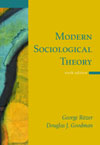
Structural Functionalism, Neofunctionalism, and Conflict Theory |  |
Learning Objectives
identify and discuss the major authors associated with structural functionalism; |
explain the functional theory of stratification and its criticisms; |
discuss and relate the dimensions of Talcott Parsons's structural functionalism, including his functional imperatives, his action system, his action schema, and his discussion of the social system and society; |
explain the role of culture in Parsons's structural functionalism; |
discuss the weaknesses of Parsons's structural functionalism; |
discuss how Robert Merton expanded and corrected structural functionalism; |
discuss the ways in which Merton attempted to overcome the problems of functionalism, including the concepts of manifest and latent functions and unanticipated consequences; |
explain Merton's theory regarding social structure and anomie; |
identify the major criticisms of structural functionalism; |
discuss Jeffrey Alexander's addition of neofunctionalism, as well as its critique; |
discuss Ralf Dahrendorf's conflict theory and identify and explain the groups inherent in his perspective and their role in conflict. |
discuss the importance of authority; |
identify the major criticisms of conflict theory; |
elaborate on the critique of theories of stratification offered by Randall Collins's conflict sociology; |
identify the major differences between conflict theory and conflict sociology; and |
discuss Collins's theory of stratification and its underpinnings. |
|
|